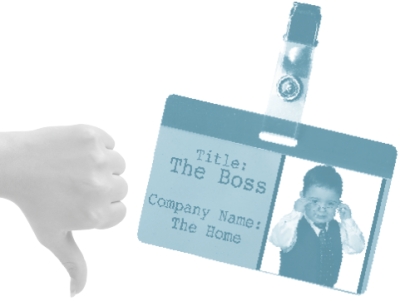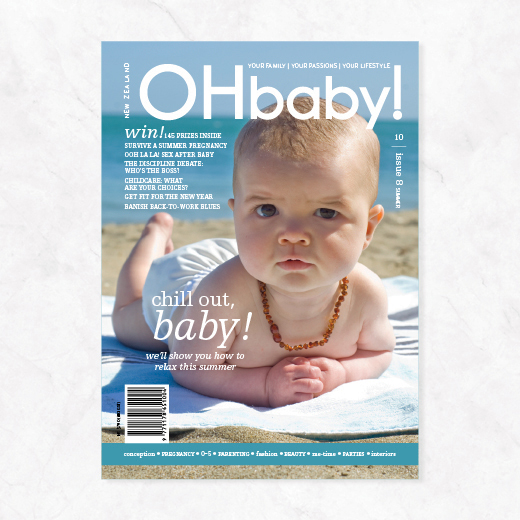Who's the boss

Taking sides: who's the boss
As children grow and change, we all know that rules and boundaries need to be put in place. But who makes the rules? .jpg)
Because I said so
by Laura Williamson
A family is not a democracy. If it were, most parents would be voted out of office in the first year and replaced by some guy whose platform included self-chosen bedtimes, lollies for breakfast, and unlimited viewings of the SpongeBob SquarePants movie. Fun, yes, but probably not good for society in the long run. No, there are things in which children should simply not have a say; sometimes, when it comes to parenting, it's one-party rule.
We all know the look. Your three-year-old, standing across the room and just out of reach, stares you directly in the eye as he grabs a truck and clonks his baby sister on the head with it. His expression is defiant, but it is also questioning. He is asking you this: You and I both know I have just done something very naughty. What are you going to do about it, Mum?
Don't worry. Your son isn't training for a career as a mugger. He is simply doing his job, which, at the age of three, is to learn how to function as a civilised human being in society. Part of this is finding out what the consequences are when he misbehaves. He looks to you, because you are the parent, and to him, you are both the judge and the law.
Kids need, and crave, clear rules. Rules are their road map to the world they live in; the guidelines that will help them navigate the bewildering subtleties of human interaction. By assaulting his sister with a truck, the boy in question hopes to discover what will happen when he does something that is obviously wrong. He doesn't need a discussion about it, he needs clarity: Bashing with truck equals a "time out" in my room. Got it. Thanks, Mum. Now on to the next thing.
Behaviour aside, when it comes to safety, authority can be very handy. A child who understands and respects the fact that she is subordinate to her parents is more likely to listen when told to stay off the road, avoid the stove, or keep her fingers out of the electrical socket. Sometimes there is no time for explanation or negotiation. Sometimes a shouted command is all that keeps a child from stepping in front of a speeding car; that she already knows such commands are to be obeyed means she's more likely to listen.
Of course, being the boss isn't always easy. One of the most difficult things for me as a parent is finding the balance between loving my son and having to discipline him. But sometimes I have to, like on a recent trip when I caught him gleefully dropping puzzle pieces one at a time out of the rear passenger window as we drove at 100km/h down State Highway 1. In a perfect world, he would never throw toys out of the car, never hit another child, and never have tantrums in public. In a perfect world, he would also get up before me in the morning and make the coffee. Of course, he's a kid, and none of this is likely. But by setting simple boundaries and enforcing them consistently, without discussion, I'm hoping to make his life, and mine, a little easier. All he needs to know is that throwing even small things onto the motorway is dangerous and unacceptable, and that there will be consequences if he does it again. Full stop.
Finally, as parents, surely one of our priorities is to let our kids just be kids. With all my life experience, if I find making rules and setting punishment and reward difficult, why would I burden my young child with the task? This doesn't mean that you have to make all of your children's choices for them. But just as they are better equipped than us to spend three hours building Lego towers and knocking them down, over and over, for no reason other than to watch them fall, we are better equipped than them to know dangerous from safe and right from wrong. We owe them the benefit of our knowledge.
Am I always the boss? No. I'm just as likely to get suckered in by big teary eyes and a less-than-sincere apology as the next parent. Does it always work when I am the boss? No. Every so often, my son, like all children, just ignores me. But he does know that when I say no I really mean it, and sometimes the only reason for "No" is because Mum says so; because when it comes from a grownup, no doesn't need an explanation.
Laura Williamson is a Wanaka-based freelance writer and editor who has been published in newspapers here and abroad over the last 15 years. Her work has appeared in Brain, Child magazine, she writes a regular column for Spoke, a New Zealand cycling publication, she is the Wanaka correspondent for QT Magazine and has written for the Otago Daily Times.

We're all in this together
by Liz Breslin
You're not the boss of me!" declared Dylan, aged three. glared back, about to insist that I most certainly was, but my husband got there first. "Quite right," he said. "You're the boss of you, aren't you, D?"
"Who's the boss of me, Daddy?" That was Lauren.
"You are, sweetheart."
"And what about Liz, is she the boss of you? Are you, Mummy? Are you the boss of Daddy?"
We looked at each other. By this point, I had caught on.
"No, darling. I'm the boss of me, Daddy's the boss of him, Dylan's the boss of himself, and you're the boss of you."
It was one of our rare moments of parental synchronicity, and we'd never discussed it, let alone thought it through before. Which is not unusual. The initial decision to have kids was hardly organised and well-planned. Nor are any of our supermarket visits. But, on occasion, out of chaos comes something fabulous, whether it is the bargain of the century or the birth of our kids. And this was one of those occasions.
It works like this. If you are the boss of yourself, then you are responsible for your own behaviour. You also have to be responsible for getting what you want by means of reason and negotiation. Being the boss of themselves seems to fall into a few categories:
Being the boss of what they want. The kids have bank accounts, with money from relatives and birthdays. If they really want something that I happen to think is lame, like a furry seal toy thing to join the mound of other soft toy things, or even something I think is cool, like a secret lockable diary with an invisible pen, being the boss of their own money helps them see the value in it. And to decide whether to buy it or not.
Being the boss of what they eat. This is pretty important when you're a kid. Back in my day, I had dinner put in front of me and was told to eat it all up before I left the table. The pressure! Now we shop together and we operate on a try-everything-at-dinner rule, and then it's up to them. They're the bosses of their appetites, after all.
Being the boss of their behaviour. This puts the onus firmly on them to be in charge of their choices and responses. You can choose to pull your brother's hair or you can choose to say "I'm tired" and sit down and suck your fngers. Sound a bit serious for a preschooler? Well, consider what would be more useful to an adult - doing what you are told just because you are told to do it, or feeling that what you are doing is somehow right and somehow connected?
What they don't get to be is boss of the house. They get to help us make house rules, but as the house (or rather the mortgage!) belongs to us as parents, the house rules fall to us as bosses. These rules can encompass bedtimes, tidy-up times, grown-up zones. But the kids are always a part of it and we never fob them off with "Because I'm the boss and because I say so." Because where's the constructive opportunity in that?
I was probably 12 years old before I really understood that my parents couldn't make me do what they wanted me to do. Late at catching on? Yes, but we do live in a different world these days. A world where kids say, "I know my rights"; where they say "You can't smack me or the police will come and get you!"; where they get to run the household as scared caregivers give in to their every whim.
You might as well give kids the responsibility and help them deal with it. Unless we're all preparing our kids for a career in the military, where is the value in teaching them to follow orders blindly? Do Dylan and Lauren obey us? Absolutely... Well, maybe 80% of the time, but they are kids!
We're confident that they follow what we ask because we have their respect. And because we rarely ever yell a menacing "NO!", we're also confident that in any danger, in any time of dire need, the kids would tune in and listen to us. Because they know we listen to and respect them too.
It takes more time, for sure. It would be so easy, like I started to that day, to invoke the attitude that we're the bosses because we're bigger and older. But ultimately, although I don't tell him so enough, my husband was totally right that day. We're all the bosses of ourselves, and to learn to get on together in the full knowledge of this is one of the hardest and most rewarding functions of our family.
Liz Breslin is a freelance writer based in Hawea Flat, New Zealand. Her short stories, poetry, and articles, including a series of opinion pieces called "Mum's the Word", have been published in New Zealand and abroad. She has also written a play called Losing Faith: A Tale of PND, exploring the issues of postnatal depression through the constraints of coffee group culture, which she is hoping to stage in 2010.

AS FEATURED IN ISSUE 8 OF OHbaby! MAGAZINE. CHECK OUT OTHER ARTICLES IN THIS ISSUE BELOW















